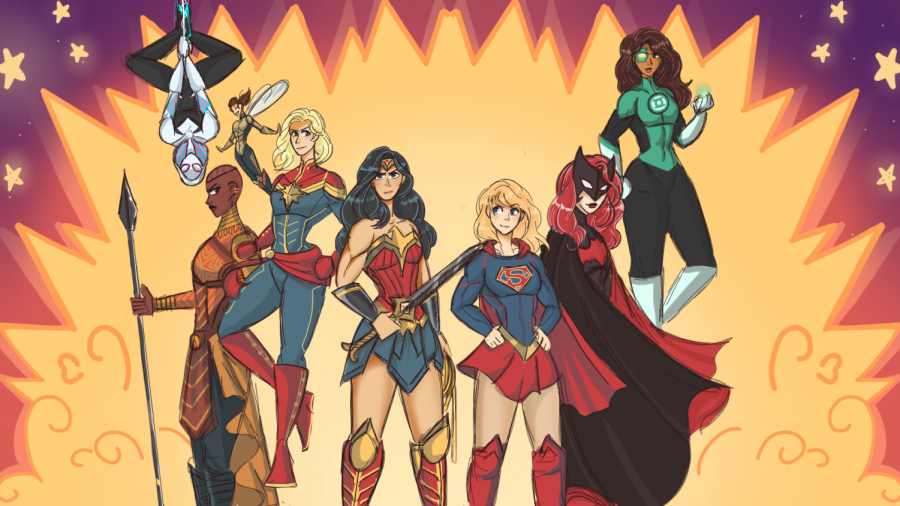We need More Female Superheroes, leaders
Graphic by Brandi Nevares.
October 23, 2018
Girls are more likely to envision themselves in leadership roles and be more confident when they see female representation in superhero movies and television shows, according to the study released on Oct. 8 by Women’s Media Center and BBC America.
The study was conducted last summer and it was administered to 2,431 boys and girls ages five to 19, as well as parents of children between the ages of five and nine years old.
Titled “Superpowering Girls: Female representation in the sci/fi superhero genre,” it revealed that girls face lower confidence rates compared to their male counterparts.
According to the study, teenage girls are less likely to describe themselves as “confident” or “brave” as boys, and 57 percent of girls in the study believe they “are not listen too” as opposed to the 37 percent of boys. The study had a lot of different findings and helped to understand the importance of stronger female representation.
While I was growing up, I never thought about women as superheroes. At least not popular ones that went beyond the Sky Dancers. I knew of Spider-Man and Batman and that was about it. From what I gathered from some Hollywood movies, the girls in the films were only there as decor and often wore revealing outfits that served no real purpose.
In recent years Hollywood saw a shift in the portrayal of people of color as superheroes; “Black Panther” and “Wonder Woman” took the world by storm, and “Wonder Woman” created an opportunity to portray a strong female as a hero.
Being confident in one’s abilities from an early age can have a great impact on how women are perceived and strive in the workplace.
I have been in a management and leadership role for a couple of years, and I learned my position from hands on experience. I recently began to train new female lead employees and this led to a discussion of how to handle being in a “power” role.
I recently had two conversations with two different young women about how employees will perceive them. It came to light that a lot of their hesitation was due to not wanting to be seen as a “dragon lady,” a term sometimes used to describe a powerful female leader and whose authority is believed to be “prickly” in a derogatory manner. The reality is being a woman in any position of power in today’s society is still rare and something people need to get used too.
I noticed how customers treat me differently as opposed to a male manager. I have also fallen into the stereotype of always having to be happy, as I was told to smile more even when attending to a serious situation.
A couple of years ago I read a study that found women are expected to apologize more in the workplace than men. Since then I made a conscious choice to not apologize unless the situation merits one. I make it a point to address everyone with respect and treat them the way I would like to be treated.
I no longer apologize for interrupting, nor do I say “I’m sorry, can you please go to the task that you are suppose to do and I have asked you twice to do already.”
It is not an easy change in personality when you are given a leadership role but Superpowering Girls suggests that by showcasing women in those superhero roles, we give little girls the advantage of learning to be more confident from an earlier age.
President of Women’s Media Center Julie Burton said, “We know that representation matters, as evidenced by this report. Our research found that female sci-fi and superhero characters help bridge the confidence gap for girls, making them feel strong, brave, confident, inspired, positive and motivated.”
The study also found that strong female representation is important in women and young girls of color in science fiction. 63 percent of girls of color in the study reported seeing a female sci/fi or superhero makes them believe they can achieve anything they put their minds too, compared to 58 percent of non-color girls.
Hollywood started to incorporate more girls of color in prominent lead roles such as in “A Wrinkle in Time,” the movie version of the popular book by Madeleine L’Engle.
The superhero trend does not seem to have an end in sight, with Oscar winner Brie Larson to star in “Captain Marvel (2019).”
However, equality amongst superheroes isn’t all smooth sailing. Online trolls reportedly altered promo pictures for “Captain Marvel” so that Brie Larson is smiling in the pictures to fit societies conventional views of female beauty.
As a response, Larson posted fan altered images of other famous superheroes such as Iron Man that were altered to feature them smiling to showcase the double standard and how ridiculous superheroes look if they are smiling in the middle of an intense scene.
While there is a long way to go in bridging the gap between how men and women feel about themselves in relation to societies ideals and demands, it is important to acknowledge the crucial part movies and media representation plays, especially on younger generations.
As we see a demand for stronger female leadership roles, we see a chance for women to be portrayed as equals and be perceived as strong as men are. Representation of women matters.
It is important to teach young girls, especially in today’s society, that they are brave and powerful, that they have consent over their bodies and they are a force to be reckoned with.






